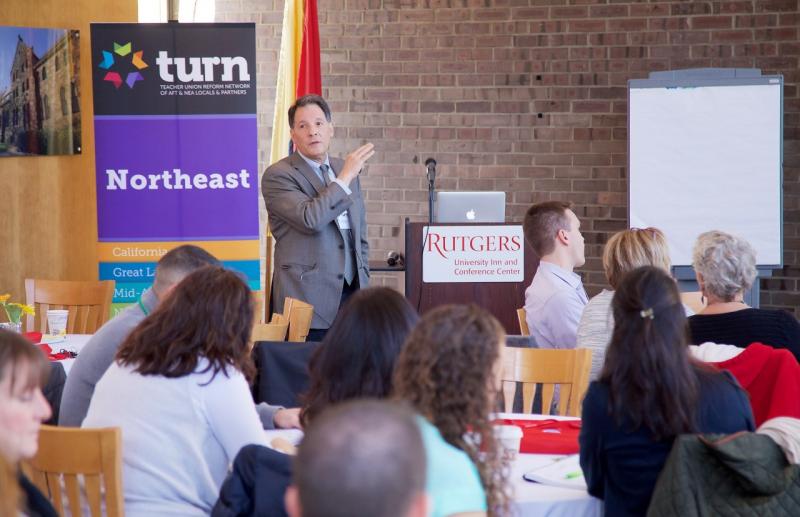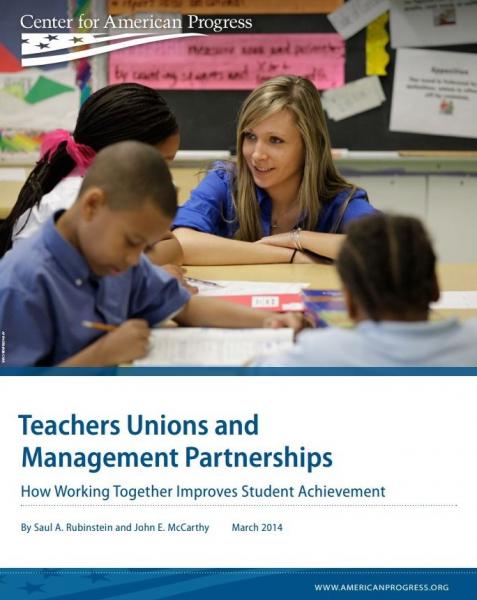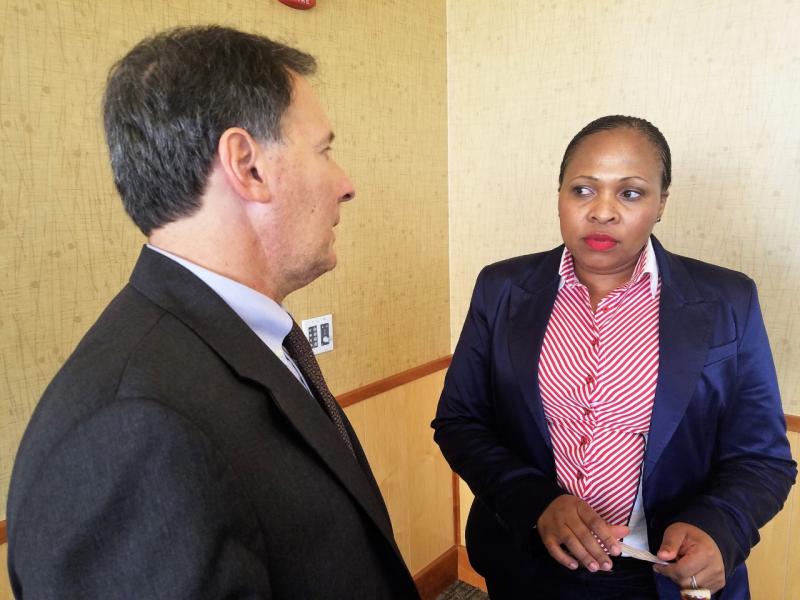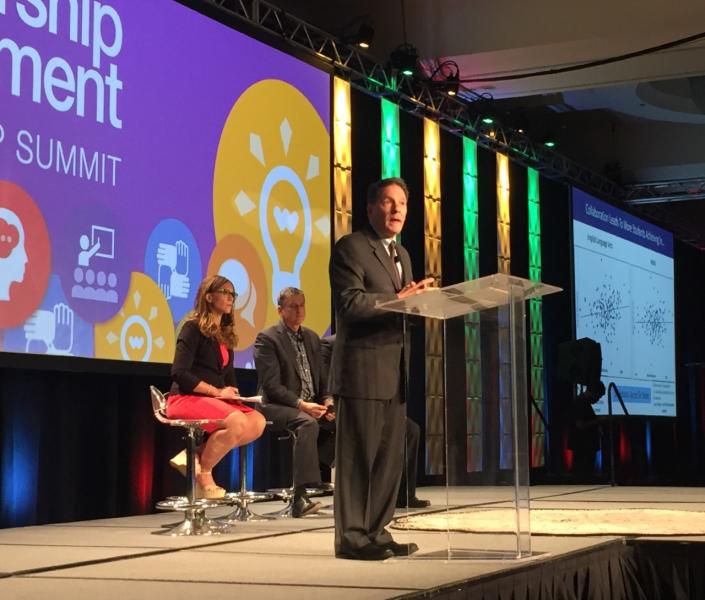
When researchers at the Rutgers School of Management and Labor Relations (SMLR) began studying the impact of union-management partnerships in public education, they discovered a remarkable trend.
Schools that embraced collaborative leadership – in which administrators work together with teachers and their unions on curriculum, instructional practice, and policies – reported higher student achievement and lower teacher turnover than schools that employ top-down change. Impressively, collaboration achieved these positive results even in the poorest schools.

Labor-Management Collaboration Conference in March 2017.
“Some say that poverty is the whole story on student achievement, and what we’re arguing is, ‘Look at these results,’” said Professor Saul Rubinstein, who directs SMLR’s Collaborative School Leadership Initiative. “When you have union-management partnership at the district level, it can create a culture of collaboration in the schools that has a positive impact on teaching and learning even after controlling for poverty.”
Rubinstein began his research in 2010, supported by a grant from the Bill and Melinda Gates Foundation. He and SMLR Ph.D. student John McCarthy analyzed data from six school districts across the U.S. and summarized their findings in a 2011 policy paper published by the Center for American Progress and a 2012 journal article published by Advances in Industrial and Labor Relations.
One of the case studies jumped off the page. The ABC Unified School District in Cerritos, California had weathered the Great Recession with no layoffs, no loss of employee health benefits, and no increase in class size.

two reports co-authored by Rubinstein and
John McCarthy.
ABC’s success formed the basis for Rubinstein and McCarthy’s second policy paper, published in 2014 by the Center for American Progress, and their 2016 journal article in the Industrial and Labor Relations Review.
“Saul and John’s research is pretty unique,” said Laura Rico, the former president of the ABC Federation of Teachers and a former national vice president of the AFL-CIO. “Now you can say, ‘I have evidence.’ There is evidence from a renowned university… that working together, in those places where our children have the most need, seems to be working.”
Engaged Scholarship
Rubinstein and Professor Charles Heckscher, Co-Directors of the SMLR Center for the Study of Collaboration in Work and Society, are putting research into action by helping eight New Jersey school districts implement a collaborative leadership model.
In addition, the professors have established the New Jersey Public Schools Labor-Management Collaborative, a coalition of education groups and teacher unions that promote dialogue in the hope of transforming policy. The group brings together:
- New Jersey Education Association (NJEA)
- American Federation of Teachers – New Jersey (AFT-NJ)
- New Jersey Schools Boards Association (NJSBA)
- New Jersey Association of School Administrators (NJASA)
- New Jersey Principals and Supervisors Association (NJPSA)
- Rutgers School of Management and Labor Relations (SMLR)
But the impact of this research is not limited to New Jersey, or even the United States.
Rubinstein traveled to South Africa in 2015 to present the research findings at the International Labor and Employment Relations Conference. While there, Rico arranged for him to meet with the South Africa Democratic Teachers Union, the Department of Basic Education, and the Education and Labour Relations Council (ELRC).
The groups are continually seeking to boost student achievement in the wake of apartheid-era racial segregation.

education leaders to SMLR in October 2016.
“We got our freedom in only 1994, so if you’re looking at the legacy that we had inherited… a lot of improvement has been achieved,” ELRC General Secretary Cindy Foca said. “But we are equally sensitive to the fact that we have not reached a point where we want to be. We’ve seen that there is room for continuous improvement.”
A collaborative leadership model, inspired by Rubinstein and McCarthy’s findings, is one of the options now under consideration. Eager to learn more, Foca and her colleagues attended a full-day workshop at Rutgers SMLR in October 2016.
“We are grateful for the fact that, in our lifetime, we came across Professor Saul’s research,” Foca said. “We are talking about changing the education landscape for the entire country, not just for one district or one school… and it’s going to be based on best practices at an international level.”
Looking Ahead
Today, SMLR’s Collaborative School Leadership Initiative is continuing to grow and expand.
McCarthy, now an assistant professor at Cornell, is working with Rubinstein to gather more and more data from across the country. They are nearing 1,000 schools in their dataset, a milestone that will enable the creation of benchmarking standards and a data dashboard.
Meanwhile, Rubinstein and Heckscher recently received a federal grant of nearly $114,000 to support the ongoing technical assistance to districts and the New Jersey Public Schools Labor-Management Collaborative.
The buzz is gradually spreading across the state and the country.
Rubinstein spoke at the NJSBA and NJEA annual gatherings in the fall, before hosting more than 100 people – including federal and state education leaders – at SMLR’s Inter-District Learning Network Conference in December. From there, he logged thousands of miles on a national circuit of presentations:

Leadership Summit in Orlando in February 2017.
- February: National Education Association (NEA) Leadership Summit, Orlando
- March: The School Superintendents Association (ASSA) National Conference on Education, New Orleans
- March: Northeast Teacher Union Reform Network (NE TURN) Labor-Management Collaboration Conference, New Brunswick
- March: National School Boards Association (NSBA) Annual Conference, Denver
Finally, Rubinstein is keeping open the lines of communication with South Africa as that nation considers a new approach to public education inspired by the research done at Rutgers SMLR.
At a time when schools are searching for ways to improve student outcomes, attract and retain talented teachers, the Collaborative School Leadership Initiative is more critical than ever.
“Teachers and their unions are vitally important to students’ success,” Rubinstein said. “The stronger the collaboration in the school, the more teachers are effective.”


